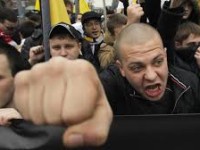Middle-class Russians joined far-right extremists in nationalist marches on Monday, in a sign of how xenophobia has taken root in mainstream society.
In 2005 president Vladimir Putin replaced a former Soviet holiday on November 4 with the Day of National Unity to mark the Russian people’s expulsion of Polish invaders in 1612. But nationalist and skinhead groups quickly hijacked the new holiday to hold the Russian March.
High quality global journalism requires investment. Please share this article with others using the link below, do not cut & paste the article.
This year, public sentiment was galvanised by ethnic tension in the Moscow suburb of Biryulyovo, where the stabbing of a Russian man by a man identified as Azerbaijani triggered violent anti-immigrant riots last month.
Police said 8,000 people, 2,000 more than last year, took part in the Russian March on Monday in Moscow, while organisers claimed that more than 20,000 had turned out. Smaller similar gatherings were held elsewhere in the capital and in other Russian cities.
Well-dressed couples, teenagers, grandmothers and families with children joined hardcore nationalists dressed in black leather and surgical masks at the rally in Lublino, a district dominated by Soviet-style prefab blocks housing lower-income Russians and immigrants.
Elena Romanova, a well-dressed personnel manager, said she had been compelled to come to the march for the first time because of the rising tensions with migrants and had been pleased to find the event “quite civilised”.
“We believe that Russia should belong to the ethnic Russians, the people who have lived on this land for centuries,” Ms Romanova said. The problem with migration “is getting worse”, she added. “Sooner or later the Russian people won’t be able to withstand it any more.”

According to official figures from Russia’s Federal Migration Service, about 2m foreign citizens received legal work permits this year. But 11m foreigners, more than 9m of them from former Soviet republics in Central Asia, were in Russia as of last month, and migration experts believe that at least another 2m are working without proper documents.
Many Russians now demand that the government close the borders to Central Asia. “Visa regime with Central Asia means visa-free access to Europe”, claimed a poster one man was carrying at the march.
Dmitry Alfyorov, an entrepreneur who self-identifies as a Nazi, said he had been coming to the march since 2006. “I don’t love Hitler but I respect a lot of things that he said. A lot of his theses should be put to use in the Slavic nations,” he said.
Financial TimesHe noted that this year’s demonstration had seen a much more diverse group of attendants than usual, a development he attributed to recent events, such as the Biryulyovo stabbing. “Today there weren’t just nationalist and fascists but ordinary people . . . In our group there were women and grandmothers marching,” Mr Alfyorov said.